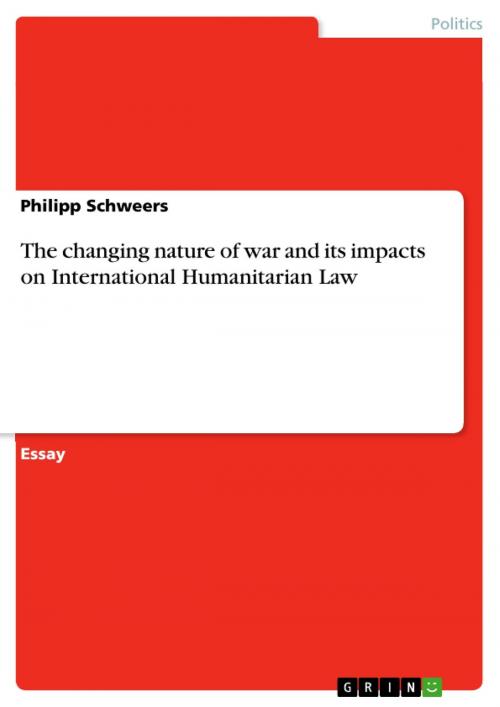| Author: | Philipp Schweers | ISBN: | 9783640356409 |
| Publisher: | GRIN Publishing | Publication: | June 24, 2009 |
| Imprint: | GRIN Publishing | Language: | English |
| Author: | Philipp Schweers |
| ISBN: | 9783640356409 |
| Publisher: | GRIN Publishing |
| Publication: | June 24, 2009 |
| Imprint: | GRIN Publishing |
| Language: | English |
Essay from the year 2009 in the subject Politics - International Politics - Topic: Public International Law and Human Rights, grade: 7,5, University of Amsterdam (Vrije Universiteit Amsterdam), course: International Humanitarian Law, language: English, abstract: At the beginning of the 21st century it seems that warfare and armed conflict get messier and more chaotic than ever before. The phenomenon of weak and fragile statehood destabilizes whole regions and makes intra-state conflict to a constant feature with spill-over character in many areas of the world. At the same time do non-state armed actors, from warlords to armed militias to terrorists to private military firms, re-enter the international conflictscene. The globalized character of contemporary organized violence, especially the phenomenon of transnational terrorism, does challenge the international security structure. While symmetric inter-state conflicts are constantly decreasing and less likely to appear, the dominant form of contemporary armed conflict is intra-state and asymmetric by nature. One of the most striking features within contemporary armed violence is the increasingly important role of civilians, as victims but also as perpetrators and participants in hostilities. The fundamental line between soldiers and civilians has long been essential to the law of war, but with the rise of transnational terrorism, warlords and other non-state actors in armed conflict this distinction gets seemingly blurred.
Essay from the year 2009 in the subject Politics - International Politics - Topic: Public International Law and Human Rights, grade: 7,5, University of Amsterdam (Vrije Universiteit Amsterdam), course: International Humanitarian Law, language: English, abstract: At the beginning of the 21st century it seems that warfare and armed conflict get messier and more chaotic than ever before. The phenomenon of weak and fragile statehood destabilizes whole regions and makes intra-state conflict to a constant feature with spill-over character in many areas of the world. At the same time do non-state armed actors, from warlords to armed militias to terrorists to private military firms, re-enter the international conflictscene. The globalized character of contemporary organized violence, especially the phenomenon of transnational terrorism, does challenge the international security structure. While symmetric inter-state conflicts are constantly decreasing and less likely to appear, the dominant form of contemporary armed conflict is intra-state and asymmetric by nature. One of the most striking features within contemporary armed violence is the increasingly important role of civilians, as victims but also as perpetrators and participants in hostilities. The fundamental line between soldiers and civilians has long been essential to the law of war, but with the rise of transnational terrorism, warlords and other non-state actors in armed conflict this distinction gets seemingly blurred.















